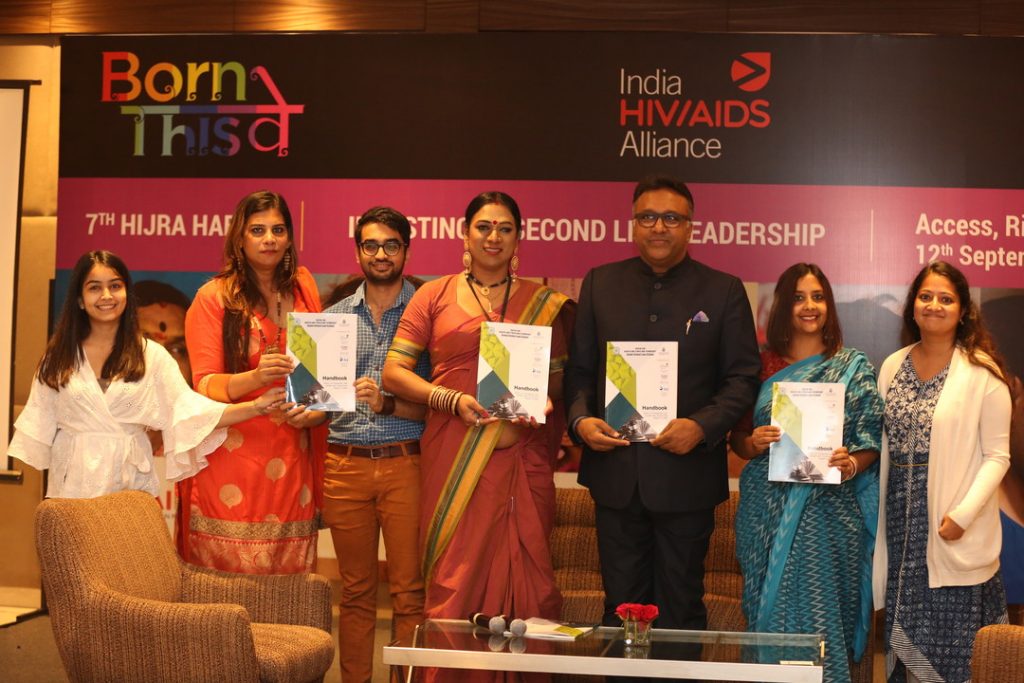
New Delhi, September 13 — A handbook titled “Rights of Transgender and Gender Non-Conforming People in India” was unveiled here by Professor (Dr) C. Raj Kumar, Founding Vice Chancellor, Jindal Global University (JGU) in the presence of transgender and gender non-conforming activists from across India.
The handbook has been prepared by Jindal Global Law School (JGLS)’s Centre for Health Law, Ethics and Technology (CHLET) under Professor Dipika Jain’s supervision as a part of her clinical course on Gender, Law, and Difference in collaboration with civil society networks, NGOs and INGOs, namely India HIV/AIDS Alliance, Multiple Action Research Group (MARG) and International Commission of Jurists (ICJ).
Professor (Dr) C Raj Kumar, Founding Vice-Chancellor, O.P. Jindal Global University and Dean of Jindal Global Law School, in his special address, thanked the transgender community for giving the faculty and students at the University an opportunity to contribute to the process of legal empowerment.
“There are very few educational spaces that provide opportunities to move beyond the classroom and engage with social movements that have the potential for fundamental social transformation. This handbook reflects Jindal Global Law School and CHLET’s commitment to this,” he said.
He further observed that the academic world does not give many opportunities for such engagement but we want such work to be taken forward for core research, community activism and advocacy. “Academicians must come out of their comfort zone and work with communities,” added Professor Kumar.
The book was unveiled on the sidelines of CHLET’s conclusion of a day-long legal training on the rights of transgender and gender non-conforming people in collaboration with India HIV/AIDS Alliance in New Delhi as part of the 7th Annual Hijra Habba. This training saw 40 participants from various States in India.
The content of the handbook also narrates the 2014 Supreme Court decision in the landmark case of National Legal Services Authority (NALSA) vs Union of India that granted legal recognition to the rights of transgender and gender non-conforming people in India. However, the success of NALSA vs Union of India was diluted in the process of translating rights into reality.
“CHLET endeavours to cultivate a strong nexus between legal awareness and legal empowerment through this Handbook that simplifies relevant aspects of constitutional and criminal law affecting everyday lives of transgender and gender non-conforming people”, observed, Dipika Jain, Associate Professor and Executive Director, CHLET, JGLS.
In May 2017, Professor Dipika Jain, in collaboration with India HIV/AIDS Alliance, MARG and ICJ, conducted the first residential course on JGU Campus using the Handbook, which is divided into four chapters: namely, Constitutional Law, Criminal Law, Getting Government Identification, and the Right to Information.
Danish Sheikh, Assistant Professor and Associate Director of the CHLET, JGLS, who translated this handbook in Hindi, said the handbook promises to bridge the gap between law and society and serve as an educational and training aid for future legal awareness workshops.
“The Handbook will be made available online, and CHLET is currently working on translating the handbook in seven regional languages as well”, he pointed out.
“This resource is a great tool for both empowerment and realization of rights for transgender people in India. This will further the leadership in communities to access their entitlements and exercise their rights as citizens of India”, said Zainab Patel, UNDP.
Abhina Aher, Hijra transgender activist and Associate Director: Sexuality, Gender and Rights, India HIV/AIDS Alliance said no empowerment is complete without legal empowerment. This Handbook is extremely important in this regard, said Aher.
Vandita Khanna, recent graduate of Jindal Global Law School said: “As students, we had the opportunity to use our legal education for the purposes of legal empowerment, and truly understand the transformative potential of the law”.
JGU’s CHLET conducts legal empirical research on contemporary questions of sexuality, gender, public policy, and public health law and works at the intersection of gender, power, sexuality, law and society with the vision to influence law and policy through research and consultations.
